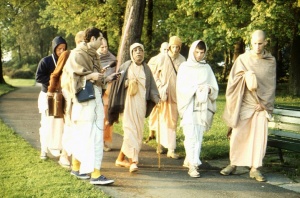CC Madhya 10.46: Difference between revisions
m (1 revision(s)) |
No edit summary |
||
| Line 1: | Line 1: | ||
{{ | [[Category:Sri Caitanya-caritamrta - Madhya-lila Chapter 10|C046]] | ||
<div style="float:left">'''[[Sri Caitanya-caritamrta|Śrī Caitanya-caritāmṛta]] - [[CC Madhya|Madhya-līlā]] - [[CC Madhya 10|Chapter 10: The Lord's Return to Jagannātha Purī]]'''</div> | |||
<div style="float:right">[[File:Go-previous.png|link=CC Madhya 10.45|Madhya-līlā 10.45]] '''[[CC Madhya 10.45|Madhya-līlā 10.45]] - [[CC Madhya 10.47|Madhya-līlā 10.47]]''' [[File:Go-next.png|link=CC Madhya 10.47|Madhya-līlā 10.47]]</div> | |||
{{CompareVersions|CC|Madhya 10.46|CC 1975|CC 1996}} | |||
{{RandomImage}} | |||
==== TEXT 46 ==== | ==== TEXT 46 ==== | ||
<div | <div class="verse"> | ||
prahararāja mahāpātra iṅha mahā-mati | :prahararāja mahāpātra iṅha mahā-mati | ||
paramānanda mahāpātra iṅhāra saṁhati | :paramānanda mahāpātra iṅhāra saṁhati | ||
</div> | </div> | ||
| Line 12: | Line 16: | ||
==== SYNONYMS ==== | ==== SYNONYMS ==== | ||
<div | <div class="synonyms"> | ||
''prahararāja''—Prahararāja; ''mahāpātra''—Mahāpātra; ''iṅha''—this; ''mahā-mati''—very intelligent; ''paramānanda mahāpātra''—Paramānanda Mahāpātra; ''iṅhāra—''of him; ''saṁhati''—combination. | |||
</div> | </div> | ||
| Line 19: | Line 23: | ||
==== TRANSLATION ==== | ==== TRANSLATION ==== | ||
<div | <div class="translation"> | ||
“This is Paramānanda Prahararāja, who is also known as Mahāpātra. He is very, very intelligent. | “This is Paramānanda Prahararāja, who is also known as Mahāpātra. He is very, very intelligent. | ||
</div> | </div> | ||
| Line 26: | Line 30: | ||
==== PURPORT ==== | ==== PURPORT ==== | ||
<div | <div class="purport"> | ||
Prahararāja is a designation given to brāhmaṇas who represent the king when the throne is vacant. In Orissa, between the time of a king’s death and the enthronement of another king, a representative must sit on the throne. This representative is called Prahararāja. The Prahararāja is generally selected from a family of priests close to the king. During the time of Śrī Caitanya Mahāprabhu, the Prahararāja was Paramānanda Prahararāja. | Prahararāja is a designation given to ''brāhmaṇas'' who represent the king when the throne is vacant. In Orissa, between the time of a king’s death and the enthronement of another king, a representative must sit on the throne. This representative is called Prahararāja. The Prahararāja is generally selected from a family of priests close to the king. During the time of Śrī Caitanya Mahāprabhu, the Prahararāja was Paramānanda Prahararāja. | ||
</div> | </div> | ||
__NOTOC__ | |||
<div style="float:right; clear:both;">[[File:Go-previous.png|link=CC Madhya 10.45|Madhya-līlā 10.45]] '''[[CC Madhya 10.45|Madhya-līlā 10.45]] - [[CC Madhya 10.47|Madhya-līlā 10.47]]''' [[File:Go-next.png|link=CC Madhya 10.47|Madhya-līlā 10.47]]</div> | |||
__NOTOC__ | |||
__NOEDITSECTION__ | |||
Revision as of 12:06, 29 July 2021

A.C. Bhaktivedanta Swami Prabhupada
TEXT 46
- prahararāja mahāpātra iṅha mahā-mati
- paramānanda mahāpātra iṅhāra saṁhati
SYNONYMS
prahararāja—Prahararāja; mahāpātra—Mahāpātra; iṅha—this; mahā-mati—very intelligent; paramānanda mahāpātra—Paramānanda Mahāpātra; iṅhāra—of him; saṁhati—combination.
TRANSLATION
“This is Paramānanda Prahararāja, who is also known as Mahāpātra. He is very, very intelligent.
PURPORT
Prahararāja is a designation given to brāhmaṇas who represent the king when the throne is vacant. In Orissa, between the time of a king’s death and the enthronement of another king, a representative must sit on the throne. This representative is called Prahararāja. The Prahararāja is generally selected from a family of priests close to the king. During the time of Śrī Caitanya Mahāprabhu, the Prahararāja was Paramānanda Prahararāja.